UiPath Bundle
How is UiPath Dominating the Automation Revolution?
As the global landscape undergoes a seismic shift driven by AI and automation, understanding UiPath SWOT Analysis is crucial. UiPath's strategic moves, especially its embrace of AI-powered automation, are setting the stage for unprecedented growth. With the RPA market poised to explode, now is the time to dissect UiPath's approach.
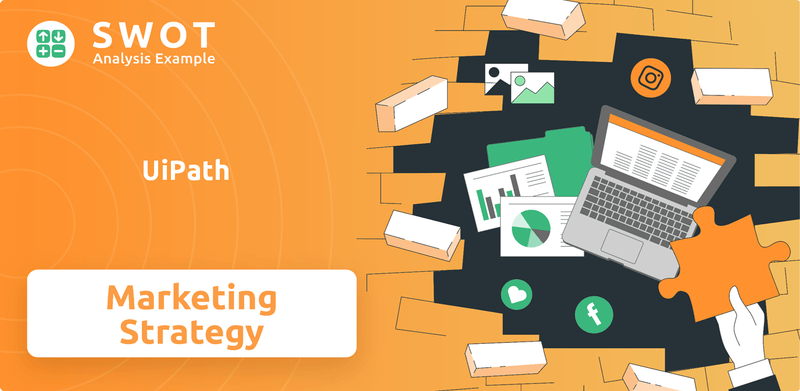
This analysis delves deep into UiPath's dynamic sales and marketing strategies, exploring its evolution from a foundational RPA provider to a leader in enterprise AI and automation. We'll dissect its go-to-market approach, examining key aspects like UiPath sales strategy, UiPath marketing strategy, and UiPath go-to-market, alongside detailed UiPath market analysis. This will provide actionable insights for investors and business strategists alike, revealing how UiPath is capturing market share and driving innovation in a rapidly evolving industry, including UiPath automation and UiPath RPA.
How Does UiPath Reach Its Customers?
The sales and marketing strategy of UiPath centers around a dual approach, combining direct sales with a robust partner network. This strategy allows UiPath to broaden its market reach and address the varied needs of its customer base. The company's go-to-market strategy is designed to maximize market penetration and customer engagement.
UiPath places a significant emphasis on its partner ecosystem. The company aims to generate approximately 95% of its business through partners, a substantial increase from around 70% in early 2024. This channel-led strategy is supported by partnerships with global system integrators and technology leaders.
The evolution of UiPath's sales channels has seen a strategic shift towards empowering partners with enhanced resources and clearer engagement models. This ensures a more aligned approach to the market. While partners primarily handle implementation, UiPath's professional services team focuses on new product introductions and account management for complex solutions. This strategic alignment enhances overall market effectiveness. For more insights, you can explore the Growth Strategy of UiPath.
UiPath's channel partner program is a crucial element of its sales strategy. This network includes global system integrators like EY and Deloitte. These partners are key in driving automation success and expanding UiPath's market presence.
UiPath has formed strategic alliances with technology leaders such as Microsoft, Amazon, and Salesforce. These alliances expand its competitive edge and integrate its offerings into broader enterprise ecosystems. A partnership with SAP enables embedded UiPath automation functionality within SAP systems.
UiPath also utilizes direct sales teams, especially for complex, customized solutions and targeted account management. This approach allows for a more personalized customer experience and ensures that specific client needs are met effectively. This direct engagement complements the partner network.
UiPath leverages distributors like Westcon-Comstor to drive adoption of its solutions by channel partners. Tools such as Partner Insights and Intelligent Demand programs support a data-driven sales approach. This omnichannel approach has contributed to UiPath's substantial growth and market share.
UiPath's sales strategy is a blend of partner-led and direct sales efforts, designed to maximize market reach. The company's focus on channel partners and strategic alliances is a key driver of its growth. This approach allows UiPath to cater to a diverse customer base with varying needs.
- Partner Ecosystem: Drives approximately 95% of business through partners.
- Strategic Alliances: Partnerships with tech leaders like Microsoft and SAP.
- Direct Sales: Focus on complex solutions and account management.
- Distribution: Utilizes distributors like Westcon-Comstor.
UiPath SWOT Analysis
- Complete SWOT Breakdown
- Fully Customizable
- Editable in Excel & Word
- Professional Formatting
- Investor-Ready Format
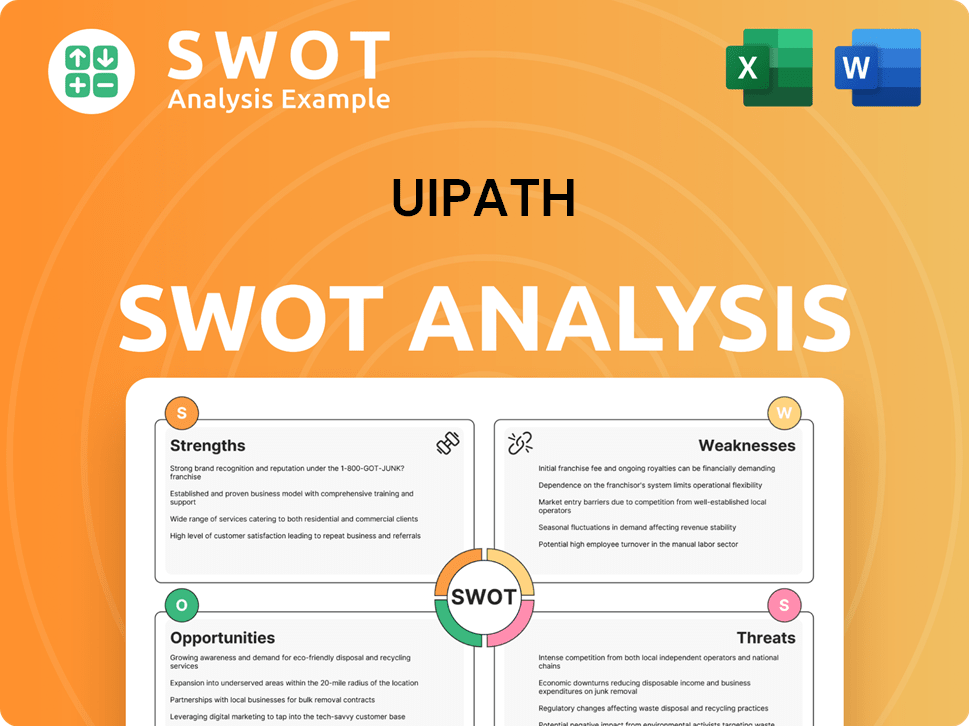
What Marketing Tactics Does UiPath Use?
The company's marketing strategy is a multifaceted approach designed to build brand awareness, generate leads, and drive sales. It heavily emphasizes digital strategies and data-driven methods to reach its target audience. This approach is crucial for maintaining a competitive edge in the rapidly evolving automation market.
Content marketing is a cornerstone of the company's strategy, providing valuable insights into the AI and automation landscape. Digital advertising, email marketing, and social media platforms are used to disseminate content, promote events, and engage with enterprise clients. Data-driven marketing allows for customer segmentation and personalization of outreach efforts, enhancing the effectiveness of marketing campaigns.
Events, both large-scale conferences and smaller regional summits, are essential for direct engagement and showcasing innovations. The company's marketing mix evolves with AI advancements, continuously integrating AI capabilities into its offerings and marketing efforts.
The company utilizes content marketing to establish thought leadership in the AI and automation space. They publish reports like the '2025 AI and Automation Trends' report, which analyzes market trends. This positions the company as an industry expert, attracting potential clients.
Digital advertising is a key component of the company's strategy, using platforms like Google Ads and social media to reach its target audience. These campaigns promote events, product launches, and thought leadership content. The goal is to drive traffic and generate leads.
Events like the annual FORWARD conference and regional summits are crucial for direct engagement. These events showcase the latest innovations and foster community. FORWARD 2024 focused on 'Transform with AI' and introduced Agentic AI.
Data-driven marketing is central to the company's approach, enabling customer segmentation and personalization. By analyzing customer data, the company tailors its outreach efforts. This increases the effectiveness of marketing campaigns and boosts lead generation.
The company integrates AI into its marketing workflows to improve productivity. Automation professionals actively use AI for tasks like writing code (67%), creating documentation (57%), and testing (47%). This approach enhances efficiency and effectiveness.
The company leverages influencer partnerships to amplify its message and reach a broader audience. Thought leadership is also used to establish credibility and build brand awareness. These strategies help to expand the company's reach.
The company's marketing strategy, including its target market, is designed to drive growth and maintain its position in the competitive RPA and automation market. By focusing on digital channels, data-driven insights, and strategic events, the company aims to attract and retain enterprise clients. The company's approach is continuously evolving to incorporate the latest advancements in AI and automation, ensuring its marketing efforts remain effective.
The company uses a mix of tactics to build brand awareness and generate leads. These include content marketing, digital advertising, events, and data-driven strategies. The focus is on reaching enterprise clients and showcasing the value of automation.
- Content Marketing: Publishing reports and insights to establish thought leadership.
- Digital Advertising: Utilizing platforms like Google Ads and social media.
- Events and Conferences: Hosting events to engage with clients directly.
- Data-Driven Marketing: Using data to personalize outreach efforts.
- AI Integration: Incorporating AI into marketing workflows.
- Influencer Partnerships: Collaborating with influencers to broaden reach.
UiPath PESTLE Analysis
- Covers All 6 PESTLE Categories
- No Research Needed – Save Hours of Work
- Built by Experts, Trusted by Consultants
- Instant Download, Ready to Use
- 100% Editable, Fully Customizable
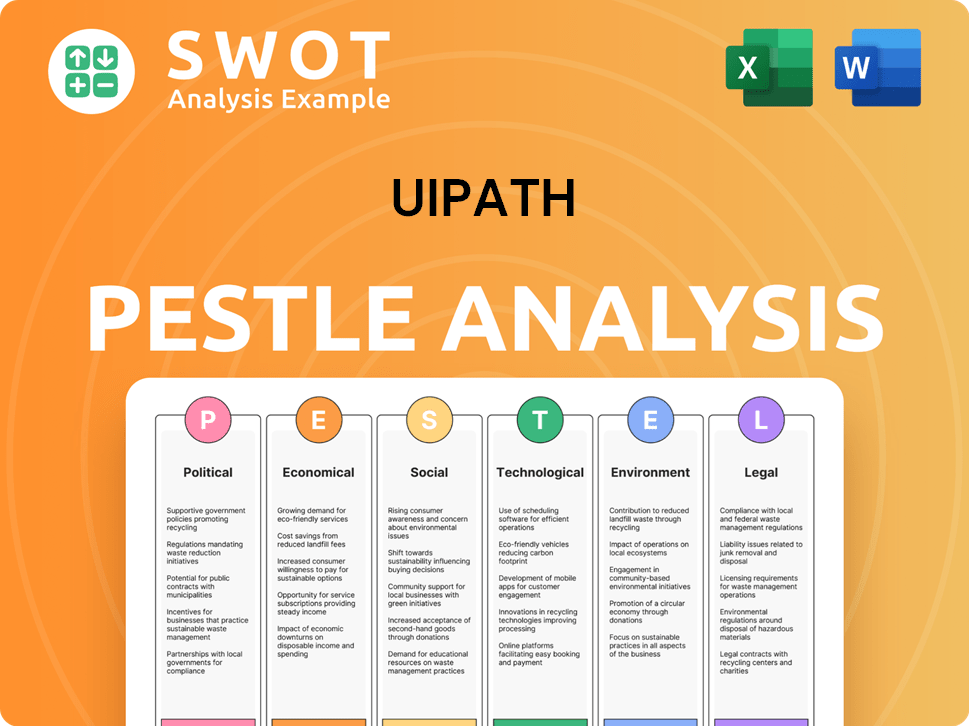
How Is UiPath Positioned in the Market?
UiPath strategically positions itself as a leading enterprise AI and automation software company. Its core message focuses on delivering a comprehensive Business Automation Platform. This platform combines robotic process automation (RPA) with AI-powered capabilities. This approach aims to understand, automate, and operate end-to-end processes, offering 'unprecedented time-to-value.'
The brand’s appeal is directed towards financially-literate decision-makers seeking operational efficiency and digital transformation. UiPath emphasizes innovation, scalability, and measurable business outcomes. This is further reinforced by its commitment to 'Automation for Good,' showcasing its dedication to empowering businesses to create sustainable value and augment human potential. The visual identity and tone of voice reflect a modern, professional, and forward-thinking technology company.
UiPath's brand positioning is consistently reinforced through its financial performance and product innovation. The company's focus on a 'controlled agency' approach for AI agents further differentiates its strategy. UiPath also emphasizes consistency across all channels, including investor relations and major events like UiPath FORWARD, to ensure a unified brand experience. This comprehensive approach supports its UiPath sales strategy and UiPath marketing strategy.
UiPath distinguishes itself by offering a complete automation solution that integrates AI. This differs from competitors that may offer only standalone RPA tools. This comprehensive approach is a key element of their UiPath go-to-market strategy.
The brand emphasizes innovation and scalability to attract decision-makers focused on operational efficiency. UiPath continually introduces new features and capabilities. This helps them stay ahead in the competitive UiPath market analysis.
UiPath highlights the measurable business outcomes that its platform delivers. This focus on results helps to attract customers who are seeking to optimize their operations. This is a core part of their UiPath automation strategy.
UiPath's strong financial performance reinforces its brand positioning. For fiscal year 2025, the company reported a non-GAAP gross margin of 85% and 31% free cash flow margins. This financial discipline attracts value investors.
UiPath's commitment to 'Automation for Good' highlights its dedication to empowering businesses. This involves creating sustainable value and augmenting human potential. This approach resonates with customers.
The brand’s visual identity and tone of voice reflect a modern and professional technology company. This helps to build trust and credibility with its target audience. It also helps in UiPath RPA adoption.
UiPath ensures consistency across all its channels and touchpoints. This includes investor relations and events like UiPath FORWARD. This consistency builds a unified brand experience.
UiPath's 'controlled agency' approach for AI agents differentiates it from competitors. This pragmatic integration of AI with existing IT automation systems provides a unique selling point. This is a key part of their UiPath product launch strategy.
UiPath continuously introduces new product innovations, such as Agentic AI and UiPath Autopilot. This continuous innovation strengthens its brand perception as a leader in automation. This drives UiPath customer acquisition strategies.
The company's strong financial performance attracts value investors. This financial discipline, coupled with continuous product innovation, strengthens its brand perception. This supports UiPath brand awareness campaigns.
UiPath's brand positioning is enhanced by several key differentiators. These include its end-to-end automation platform, focus on measurable outcomes, and commitment to 'Automation for Good'. These factors contribute to a strong market presence.
- Comprehensive Automation Platform
- Focus on Measurable Outcomes
- Commitment to 'Automation for Good'
- Continuous Product Innovation
For more insights into UiPath's strategy, you can refer to a detailed analysis of their approach to the market in this article about UiPath by [customized anchor text].
UiPath Business Model Canvas
- Complete 9-Block Business Model Canvas
- Effortlessly Communicate Your Business Strategy
- Investor-Ready BMC Format
- 100% Editable and Customizable
- Clear and Structured Layout
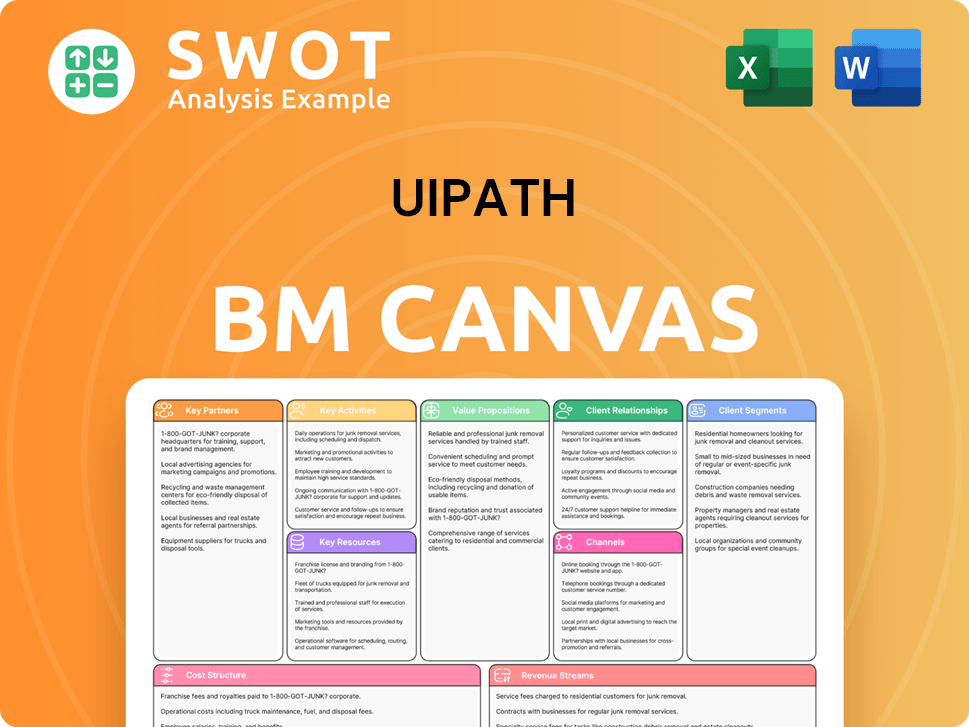
What Are UiPath’s Most Notable Campaigns?
The company's sales and marketing efforts are significantly shaped by its key campaigns, which focus on driving adoption of its automation platform. These campaigns are designed to highlight the transformative power of automation and AI, particularly within enterprise environments. The company's approach includes large-scale events, strategic partnerships, and targeted educational initiatives to reach its target audience.
A core element of the company's strategy involves showcasing how its platform integrates with broader enterprise ecosystems, emphasizing the value of its technology in improving business operations. The company's goal is to position itself as a leader in the automation space, driving growth and innovation within the industry. The company leverages a mix of digital content, in-person events, and strategic partnerships to achieve its marketing objectives.
The company's 'Agentic AI' campaign, launched at the UiPath FORWARD 2024 conference, is a prime example of its focus on AI-driven automation. This campaign aims to redefine automation by introducing AI-driven agents that can make decisions and adapt to changing environments. The company's success is reflected in its financial performance, with an Annual Recurring Revenue (ARR) of $1.666 billion as of January 31, 2025.
This campaign, launched at UiPath FORWARD 2024, emphasized the transformative power of AI in automation. The objective was to signal a new era where AI agents make contextual decisions, expanding the scope of automatable tasks. The campaign included a large in-person event, press releases, and digital content.
The ongoing summit series, running through 2024 and 2025, educates senior peers on the value of combining AI and automation. The creative concept focuses on practical insights for an AI-driven future. These summits use in-person workshops and networking opportunities.
The company highlights its strategic partnerships with tech giants like Microsoft and enterprise software providers like SAP. These collaborations are communicated through joint announcements and case studies to boost credibility. The partnership with SAP focuses on embedding the company's automation into SAP's ecosystem.
The company's focus on AI-driven automation and strategic partnerships are key elements of its market strategy. The company's growth in the automation landscape is supported by the fact that 90% of IT leaders are expected to prioritize agentic AI for complex workflows by February 2025. For more insights, check out the Revenue Streams & Business Model of UiPath.
UiPath Porter's Five Forces Analysis
- Covers All 5 Competitive Forces in Detail
- Structured for Consultants, Students, and Founders
- 100% Editable in Microsoft Word & Excel
- Instant Digital Download – Use Immediately
- Compatible with Mac & PC – Fully Unlocked
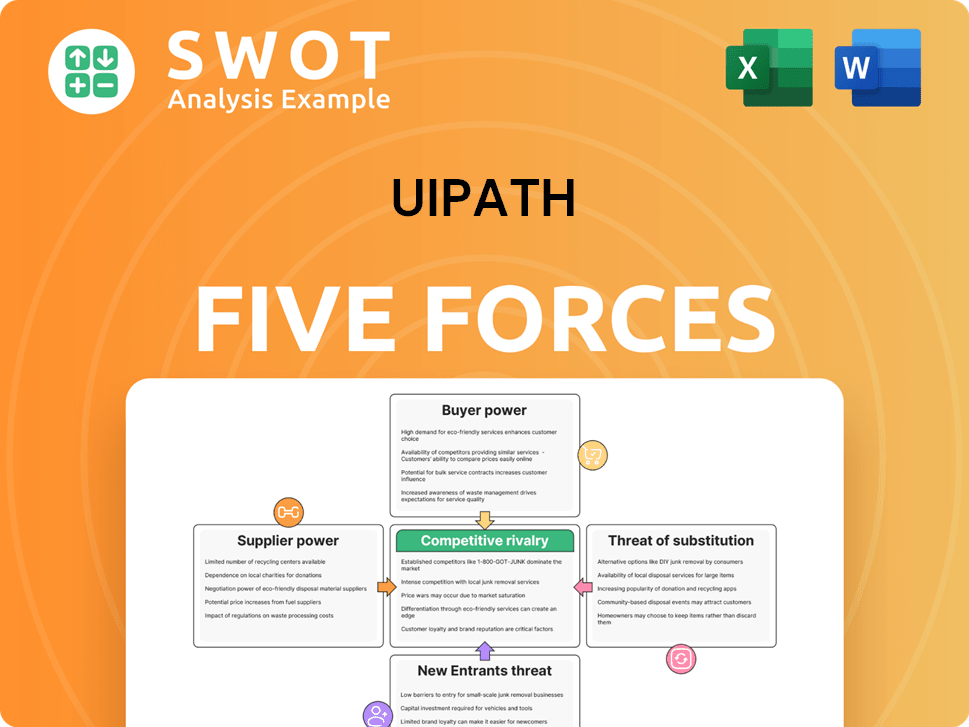
Related Blogs
- What are Mission Vision & Core Values of UiPath Company?
- What is Competitive Landscape of UiPath Company?
- What is Growth Strategy and Future Prospects of UiPath Company?
- How Does UiPath Company Work?
- What is Brief History of UiPath Company?
- Who Owns UiPath Company?
- What is Customer Demographics and Target Market of UiPath Company?
Disclaimer
All information, articles, and product details provided on this website are for general informational and educational purposes only. We do not claim any ownership over, nor do we intend to infringe upon, any trademarks, copyrights, logos, brand names, or other intellectual property mentioned or depicted on this site. Such intellectual property remains the property of its respective owners, and any references here are made solely for identification or informational purposes, without implying any affiliation, endorsement, or partnership.
We make no representations or warranties, express or implied, regarding the accuracy, completeness, or suitability of any content or products presented. Nothing on this website should be construed as legal, tax, investment, financial, medical, or other professional advice. In addition, no part of this site—including articles or product references—constitutes a solicitation, recommendation, endorsement, advertisement, or offer to buy or sell any securities, franchises, or other financial instruments, particularly in jurisdictions where such activity would be unlawful.
All content is of a general nature and may not address the specific circumstances of any individual or entity. It is not a substitute for professional advice or services. Any actions you take based on the information provided here are strictly at your own risk. You accept full responsibility for any decisions or outcomes arising from your use of this website and agree to release us from any liability in connection with your use of, or reliance upon, the content or products found herein.